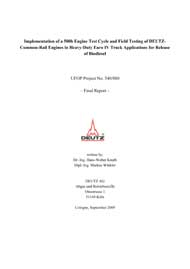
Project report for the release of DEUTZ Euro IV common rail engines for biodiesel out
The availability of release declarations is the precondition for the future marketing of biodiesel as only fuel or as blending component in diesel fuel. With the target of obtaining the release for the TCD 2013 4V of emission level EURO IV with DEUTZ Common Rail injection system in commercial trucks, an engine and function test on the test rig and a field test for making sure of the biodiesel compatibility were performed by DEUTZ AG with financial assistance from the Union zur Förderung von Oel- und Proteinpflanzen e.V. (UFOP).
The test rig trial comprised a 500-hour test run based on the DEUTZ in-house norm, tests checking function and consumption, as well as emission measurements according to the statutory test cycles. The state of the engine at rated power was inspected daily, at the same time lubricating oil analyses were performed and finally the engine was examined by DEUTZ and the injection system by BOSCH.
The field test comprised testing two bus engines operated by IOV Omnibusverkehr GmbH, Illmenau, and, in particular, the performance of lubricating oil analyses. As a result of these extensive test series, DEUTZ AG issued the release statement for this engine series for use of up to 30 per cent biodiesel in diesel fuel. The report points out that even if the basic engine could be released for B100, the release would have to consider the whole system, including exhaust treatment and the on-board diagnosis system (OBD). The release is restricted to B30 because as a result of this project the need for more research was identified as regards the possible poisoning of the SCR exhaust after-treatment by potassium and sodium and possible error messages which the OBD system might display if the engine was running on biodiesel only.
In conclusion, DEUTZ AG states that the following requirements must be met and questions answered for emission level EURO IV exhaust engines in commercials which can also run on 100 per cent biodiesel:
- Response of the OBD due to reduced output from the use of biodiesel; - Checking the series capability of biodiesel sensors; in the opinion of DEUTZ AG, biodiesel sensors can only be done without if not more than 30 percent by volume of biodiesel (B30) is contained in the fuel; - Alkali and earth alkali elements and other catalyst contaminators (e.g., phosphorus) may cause deactivation of the diesel catalytic converter; - Ash forming elements cause undesired contamination of the diesel particulate filter.
On this background, DEUTZ AG recommends using exclusively biodiesel of assured quality.
As a result of this project, UFOP is now supporting a project for the evaluation of metal contents as well as ash forming components and catalyst contaminators in biodiesel on the basis of the extensive database of Arbeitsgemeinschaft Qualitätsmanagement Biodiesel e.V. (Association Quality Management Biodiesel reg. ASS). According to UFOP, the above requirements can be met and the answers to the questions found. Therefore, UFOP provides funds for another project of DEUTZ AG initially with the target of obtaining the B100 release for Agripower engines of emission level IV (with SCR).
This report can be downloaded here.


 Union zur Förderung von Oel- und Proteinpflanzen E.V.
Union zur Förderung von Oel- und Proteinpflanzen E.V.